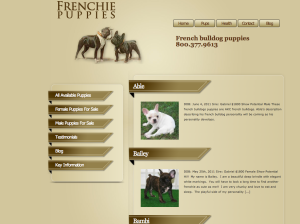Although, I am often wont to look askance at the doings of HSUS, this press release, “Dirty Dozen” Puppy Mill Posing as Dog Rescue Group, caught my eye. I checked into it a bit further.
It appears even dog rescue should be a local process – either visiting your local shelter or working directly with a local rescue group . Looks like both internet breeders AND internet rescue are best avoided.
It seems that this puppy mill
also operates this “rescue” where $500 to $900 will let you “rescue” what appear to be older, maybe no longer useful/saleable mill dogs. “Donations” are also encouraged ( Hmmm, why did I never think of that?!!). These sites are very convincing. They “talk the talk”.
I have no doubt these poor animals deserve to be rescued, but ideally not in a way that supports the very system they came from. Those of us that choose to adopt must be aware that rescue has become ” the new black” ( as I recently heard someone say). There are those that will take advantage of the good-hearted souls who offer help to homeless animals.
As with any charitable organization, it’s worth checking into credentials before getting involved with any rescue group. Careful screening and selection is as important in rescue as it is in chosing a breeder. No one wants to perpetuate, however inadvertently, the mill system of dog breeding.
We breeders can do our bit by keeping a current list of local rescue organizations on hand for clients that express interest. Potential adopters then have a better chance of connecting with groups they can develop a relationship with. All good stuff that increases the chances a rescued dog will be a good, permanent fit!



Too true Alison, another twist is that some recues purchase old breed stock from puppy mills at auctions and sell them as rescues. Same sort of thing as purchasing a pet store puppy to “save” it. there seem to be a lot of rescue groups popping up, the folks shipping in from down south and as you mentioned mills posing as rescues. Some of the ship ins are ok, they evaluate the dogs carefully and try to match dogs with correct homes. But some are not, and the dogs are disease ridden parvo, distemper, heartworm and have unknown temps. As a longtime active rescue foster home, I suggest people take as much, if not more time evaluating a rescue group as they do a breeder.
It’s hard to know what to do. I have no problem with the buying of rescue dogs. Good care of any animal takes time and money. I do have a problem with that money essentially providing capital that subsidizes the very hell hole some of these animals come out of. That said, I’d have a very hard time putting my wallet away if I were staring into the forlorn eyes of an old, throwaway mill dog…Complex problem, complex solutions. Education, education, education…Oh yeah, and local sources ( gee, have I mentioned that before? :))
Alison, wonderful blog. I’m so proud of you and what you are trying to accomplish.
I’ve had the unfortunate experience of having to deal with some of these so called rescues here in the south. Some have been known to lie about the temperment and/or condition of dogs just to get them sent out to unknowing rescue groups up north. They have stopped asking me to test dogs as I won’t pass any that might pose a risk. They just wanted me to look at them so that they could say that a trainer was there.
The final straw for me trying to help them was 2 dogs in particular. One a Bulldog that had such severe mange that the vet advised euthanasia. I concurred. They said they would attempt to clear it up but instead the next day they shipped it to a Bulldog rescue without informing them of the mange (and no health cert.) The second dog was a lab mix that they boarded with me while awaiting transport. The dog had turned on a worker at the shelter but had seemed fine for the 2 days after. Once here he showed his true colors growling when things didn’t go his way and turning on Gary unpredictably. When transport came to get him they wanted my written opinion about the dog to give to the NY rescue. I wrote on his health papers about his issues and that he was in no way to go directly into adoption and needed further evaluation. Well, suffice to say I wasn’t too popular with the rescue group here.
I think there are good and not-so-good breeders and rescues. Same with bakers, mechanics and dentists.
What a shame your experience and willingness to help wasn’t a fit for the rescue you wrote about. In the same way that some breeders are their own worst enemies, some rescues frustrate and alienate those that would help. The work of connecting dogs ( rescued or not) with pet owners is important work and will benefit from professionalization and education.
Thanks for taking the time to comment, Kim.
I just stumbled across your fantastic blog doing some pedigree research and on a quest for a good aussie breeder.